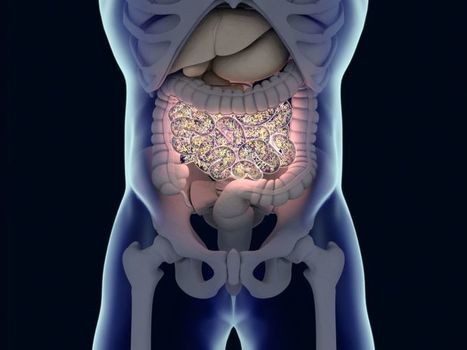When we looked at stool from breast and lung cancer patients, we discovered that important bacteria were missing from the microbiome,” Culler says. The absence of certain gut microbes, mostly Firmicutes bacteria, could explain why immune checkpoint inhibitors—drugs that block cancer-friendly proteins and help facilitate the immune system’s response to cancer cells—don’t work on some patients. “We believe that those bacteria are important for the immune system to be able to respond to those drugs,” Culler says.
Along with fellow chemical engineer Steve Van Dien, Culler cofounded Persephone Biome in the summer of 2017 to study the relationship between gut bacteria and cancer. Named for Persephone, the Greek goddess of vegetation who appears in the spring and descends back into the underworld after harvesttime, Culler’s company is gearing up for clinical trials that will test specific gut microbes to see if they improve the function of checkpoint inhibitors in breast and non-small cell lung cancer patients. (A second product will focus on CAR-T cell therapy, which uses patients’ own immune cells that have been genetically engineered to treat their cancer.)
“Our goal is to create therapeutics to convert non-responders into responders,” Culler says, referring to patients who do or do not respond to checkpoint inhibitors. Her company hopes to engineer a mix of selected gut bacteria that can be taken in pill form to heal patients’ microbiomes, which can be damaged by antibiotics and poor diet, as she discussed recently in a talk at TEDx San Diego.
Learn more / En savoir plus / Mehr erfahren:
https://www.scoop.it/t/21st-century-innovative-technologies-and-developments/?&tag=Cancer



 Your new post is loading...
Your new post is loading...








Acquista Online La Prescrizione Di Perdita Di Peso
Crediamo che i farmaci a volte possano essere molto urgenti da assumere. Se hai urgente bisogno di farmaci, possiamo anche fornirti una consegna espressa,
https://www.google.it/url?q=https://globalefarmacia.com/Prodotto/acquista-ozempic-online/
https://www.google.it/url?q=https://globalefarmacia.com/Prodotto/acquista-victoza-online/
https://www.google.it/url?q=https://globalefarmacia.com/Prodotto/acquista-mounjaro-online/
https://www.google.it/url?q=https://globalefarmacia.com/Prodotto/acquista-mysimba-online/
https://www.google.it/url?q=https://globalefarmacia.com/Prodotto/acquista-wegovy-online/
https://www.google.it/url?q=https://globalefarmacia.com/Prodotto/acquistare-saxenda-6mg-ml-online/
https://www.google.it/url?q=https://globalefarmacia.com/Prodotto/acquista-phentermine-online/
https://www.google.it/url?q=https://globalefarmacia.com/Prodotto/acquistare-sibutramina-online/
https://www.google.it/url?q=https://globalefarmacia.com/Prodotto/ephedrine-hcl-30mg/
https://www.google.it/url?q=https://globalefarmacia.com/Prodotto/acquista-adderall-30mg/
https://www.google.it/url?q=https://globalefarmacia.com/Prodotto/acquista-adipex-online/
https://www.google.it/url?q=https://globalefarmacia.com/Prodotto/acquista-vyvanse-online/
https://www.google.it/url?q=https://globalefarmacia.com/Prodotto/acquista-ossicodone-online/
https://www.google.it/url?q=https://globalefarmacia.com/Prodotto/acquista-oxycontin-online/
https://www.google.it/url?q=https://globalefarmacia.com/Prodotto/acquista-percocet-online/
https://www.google.it/url?q=https://globalefarmacia.com/Prodotto/acquista-stilnox-online/
https://www.google.it/url?q=https://globalefarmacia.com/Prodotto/acquista-suboxone-8mg/
https://www.google.it/url?q=https://globalefarmacia.com/Prodotto/acquista-subutex-online/
https://www.google.it/url?q=https://globalefarmacia.com/Prodotto/acquista-metadone/
https://www.google.it/url?q=https://globalefarmacia.com/Prodotto/acquista-botox-online/
https://www.google.it/url?q=https://globalefarmacia.com/Prodotto/acquistare-rohypnol-2mg/
https://www.google.it/url?q=https://globalefarmacia.com/Prodotto/acquista-l-ritalin-online/
https://www.google.it/url?q=https://globalefarmacia.com/Prodotto/acquista-adma-online/
https://www.google.it/url?q=https://globalefarmacia.com/Prodotto/a-215-ossicodone-actavis/
https://www.google.it/url?q=https://globalefarmacia.com/Prodotto/acquista-ativan-online/
https://www.google.it/url?q=https://globalefarmacia.com/Prodotto/acquista-cerotti-al-fentanil/
https://www.google.it/url?q=https://globalefarmacia.com/Prodotto/acquista-codeina-linctus-online/
https://www.google.it/url?q=https://globalefarmacia.com/Prodotto/acquista-codeina-online/
https://www.google.it/url?q=https://globalefarmacia.com/Prodotto/acquista-demerol-online/
https://www.google.it/url?q=https://globalefarmacia.com/Prodotto/acquista-depalgo-online/
https://www.google.it/url?q=https://globalefarmacia.com/Prodotto/acquista-diazepam-online/
https://www.google.it/url?q=https://globalefarmacia.com/Prodotto/acquista-dilaudid-8mg/
https://www.google.it/url?q=https://globalefarmacia.com/Prodotto/acquista-endocet-online/
https://www.google.it/url?q=https://globalefarmacia.com/Prodotto/acquista-eroina-bianca/
https://www.google.it/url?q=https://globalefarmacia.com/Prodotto/acquista-opana-online/
https://www.google.it/url?q=https://globalefarmacia.com/Prodotto/acquista-vicodin-online/
https://www.google.it/url?q=https://globalefarmacia.com/Prodotto/acquista-xanax-2mg/
https://www.google.it/url?q=https://globalefarmacia.com/Prodotto/efedrina-hcl-in-polvere/
https://www.google.it/url?q=https://globalefarmacia.com/Prodotto/sciroppo-di-metadone/
https://www.google.it/url?q=https://globalefarmacia.com/Prodotto/tramadolo-hcl-200mg/
https://globalefarmacia.com/Prodotto/acquista-ozempic-online/
https://globalefarmacia.com/Prodotto/acquista-victoza-online/
https://globalefarmacia.com/Prodotto/acquista-mounjaro-online/
https://globalefarmacia.com/Prodotto/acquista-mysimba-online/
https://globalefarmacia.com/Prodotto/acquista-wegovy-online/
https://globalefarmacia.com/Prodotto/acquistare-saxenda-6mg-ml-online/
https://globalefarmacia.com/Prodotto/acquista-phentermine-online/
https://globalefarmacia.com/Prodotto/acquistare-sibutramina-online/
https://globalefarmacia.com/Prodotto/ephedrine-hcl-30mg/
https://globalefarmacia.com/Prodotto/acquista-adderall-30mg/
https://globalefarmacia.com/Prodotto/acquista-adipex-online/
https://globalefarmacia.com/Prodotto/acquista-vyvanse-online/
https://globalefarmacia.com/Prodotto/acquista-ossicodone-online/
https://globalefarmacia.com/Prodotto/acquista-oxycontin-online/
https://globalefarmacia.com/Prodotto/acquista-percocet-online/
https://globalefarmacia.com/Prodotto/acquista-stilnox-online/
https://globalefarmacia.com/Prodotto/acquista-suboxone-8mg/
https://globalefarmacia.com/Prodotto/acquista-subutex-online/
https://globalefarmacia.com/Prodotto/acquista-metadone/
https://globalefarmacia.com/Prodotto/acquista-botox-online/
https://globalefarmacia.com/Prodotto/acquistare-rohypnol-2mg/
https://globalefarmacia.com/Prodotto/acquista-l-ritalin-online/
https://globalefarmacia.com/Prodotto/acquista-adma-online/
https://globalefarmacia.com/Prodotto/a-215-ossicodone-actavis/
https://globalefarmacia.com/Prodotto/acquista-ativan-online/
https://globalefarmacia.com/Prodotto/acquista-cerotti-al-fentanil/
https://globalefarmacia.com/Prodotto/acquista-codeina-linctus-online/
https://globalefarmacia.com/Prodotto/acquista-codeina-online/
https://globalefarmacia.com/Prodotto/acquista-demerol-online/
https://globalefarmacia.com/Prodotto/acquista-depalgo-online/
https://globalefarmacia.com/Prodotto/acquista-diazepam-online/
https://globalefarmacia.com/Prodotto/acquista-dilaudid-8mg/
https://globalefarmacia.com/Prodotto/acquista-endocet-online/
https://globalefarmacia.com/Prodotto/acquista-eroina-bianca/
https://globalefarmacia.com/Prodotto/acquista-opana-online/
https://globalefarmacia.com/Prodotto/acquista-vicodin-online/
https://globalefarmacia.com/Prodotto/acquista-xanax-2mg/
https://globalefarmacia.com/Prodotto/efedrina-hcl-in-polvere/
https://globalefarmacia.com/Prodotto/sciroppo-di-metadone/
https://globalefarmacia.com/Prodotto/tramadolo-hcl-200mg/
<a href="https://globalefarmacia.com/Prodotto/acquista-ozempic-online/">acquista-ozempic-online</a>;
<a href="https://globalefarmacia.com/Prodotto/acquista-victoza-online/">acquista-victoza-online</a>;
<a href="https://globalefarmacia.com/Prodotto/acquista-mounjaro-online/">acquista-mounjaro-online</a>;
<a href="https://globalefarmacia.com/Prodotto/acquista-mysimba-online/">acquista-mysimba-online</a>;
<a href="https://globalefarmacia.com/Prodotto/acquista-wegovy-online/">acquista-wegovy-online</a>;
<a href="https://globalefarmacia.com/Prodotto/acquistare-saxenda-6mg-ml-online/">acquistare-saxenda-6mg-ml-online</a>;
<a href="https://globalefarmacia.com/Prodotto/acquista-phentermine-online/">acquista-phentermine-online</a>;
<a href="https://globalefarmacia.com/Prodotto/ephedrine-hcl-30mg/">ephedrine-hcl-30mg</a>;
<a href="https://globalefarmacia.com/Prodotto/acquista-ossicodone-online/">acquista-ossicodone-online</a>;
<a href="https://globalefarmacia.com/Prodotto/acquista-oxycontin-online/">acquista-oxycontin-online</a>;
<a href="https://globalefarmacia.com/Prodotto/acquista-percocet-online/">acquista-percocet-online</a>;
<a href="https://globalefarmacia.com/Prodotto/acquista-stilnox-online/">acquista-stilnox-online</a>;
<a href="https://globalefarmacia.com/Prodotto/acquista-suboxone-8mg/">acquista-suboxone-8mg</a>;
<a href="https://globalefarmacia.com/Prodotto/acquista-subutex-online/">acquista-subutex-online</a>;
<a href="https://globalefarmacia.com/Prodotto/acquista-metadone/">acquista-metadone</a>;
<a href="https://globalefarmacia.com/Prodotto/buy-vyvanse-online/">buy-vyvanse-online</a>;
<a href="https://globalefarmacia.com/Prodotto/a-215-ossicodone-actavis/">a-215-ossicodone-actavis</a>;
<a href="https://globalefarmacia.com/Prodotto/acquista-adderall-30mg/">acquista-adderall-30mg</a>;
<a href="https://globalefarmacia.com/Prodotto/acquista-adipex-online/">acquista-adipex-online</a>;
<a href="https://globalefarmacia.com/Prodotto/acquista-adma-online/">acquista-adma-online</a>;
<a href="https://globalefarmacia.com/Prodotto/acquista-ativan-online/">acquista-ativan-online</a>;
<a href="https://globalefarmacia.com/Prodotto/acquista-botox-online/">acquista-botox-online</a>;
<a href="https://globalefarmacia.com/Prodotto/acquista-cerotti-al-fentanil/">acquista-cerotti-al-fentanil</a>;
<a href="https://globalefarmacia.com/Prodotto/acquista-codeina-linctus-online/">acquista-codeina-linctus-online</a>;
<a href="https://globalefarmacia.com/Prodotto/acquista-codeina-online/">ta-codeina-online</a>;
<a href="https://globalefarmacia.com/Prodotto/acquista-demerol-online/">acquista-demerol-online</a>;
<a href="https://globalefarmacia.com/Prodotto/acquista-depalgo-online/">acquista-depalgo-online</a>;
<a href="https://globalefarmacia.com/Prodotto/acquista-diazepam-online/">acquista-diazepam-online</a>;
<a href="https://globalefarmacia.com/Prodotto/acquista-dilaudid-8mg/">acquista-dilaudid-8mg</a>;
<a href="https://globalefarmacia.com/Prodotto/acquista-endocet-online/">acquista-endocet-online</a>;
<a href="https://globalefarmacia.com/Prodotto/acquista-eroina-bianca/">acquista-eroina-bianca</a>;
<a href="https://globalefarmacia.com/Prodotto/acquista-l-ritalin-online/">acquista-l-ritalin-online</a>;
<a href="https://globalefarmacia.com/Prodotto/acquista-opana-online/">acquista-opana-online</a>;
<a href="https://globalefarmacia.com/Prodotto/acquista-vicodin-online/">acquista-vicodin-online</a>;
<a href="https://globalefarmacia.com/Prodotto/acquista-xanax-2mg/">acquista-xanax-2mg</a>;
<a href="https://globalefarmacia.com/Prodotto/acquistare-rohypnol-2mg/">acquistare-rohypnol-2mg</a>;
<a href="https://globalefarmacia.com/Prodotto/acquistare-sibutramina-online/">acquistare-sibutramina-online</a>;
<a href="https://globalefarmacia.com/Prodotto/efedrina-hcl-in-polvere/">efedrina-hcl-in-polvere</a>;
<a href="https://globalefarmacia.com/Prodotto/sciroppo-di-metadone/">sciroppo-di-metadone</a>;
<a href="https://globalefarmacia.com/Prodotto/tramadolo-hcl-200mg/">tramadolo-hcl-200mg</a>;
<a href="https://www.google.it/url?q=https://globalefarmacia.com/Prodotto/acquista-ozempic-online/" rel="dofollow">acquista-ozempic-online</a>
<a href="https://www.google.it/url?q=https://globalefarmacia.com/Prodotto/acquista-victoza-online/" rel="dofollow">acquista-victoza-online</a>
<a href="https://www.google.it/url?q=https://globalefarmacia.com/Prodotto/acquista-mounjaro-online/" rel="dofollow">acquista-mounjaro-online</a>
<a href="https://www.google.it/url?q=https://globalefarmacia.com/Prodotto/acquista-mysimba-online/" rel="dofollow">acquista-mysimba-online</a>
<a href="https://www.google.it/url?q=https://globalefarmacia.com/Prodotto/acquista-wegovy-online/" rel="dofollow">acquista-wegovy-online</a>
<a href="https://www.google.it/url?q=https://globalefarmacia.com/Prodotto/acquistare-saxenda-6mg-ml-online/" rel="dofollow">acquistare-saxenda-6mg-ml-online</a>
<a href="https://www.google.it/url?q=https://globalefarmacia.com/Prodotto/acquista-phentermine-online/" rel="dofollow">acquista-phentermine-online</a>
<a href="https://www.google.it/url?q=https://globalefarmacia.com/Prodotto/acquistare-sibutramina-online/" rel="dofollow">acquistare-sibutramina-online</a>
<a href="https://www.google.it/url?q=https://globalefarmacia.com/Prodotto/ephedrine-hcl-30mg/" rel="dofollow">ephedrine-hcl-30mg</a>
<a href="https://www.google.it/url?q=https://globalefarmacia.com/Prodotto/acquista-adderall-30mg/" rel="dofollow">acquista-adderall-30mg</a>
<a href="https://www.google.it/url?q=https://globalefarmacia.com/Prodotto/acquista-adipex-online/" rel="dofollow">acquista-adipex-online</a>
<a href="https://www.google.it/url?q=https://globalefarmacia.com/Prodotto/acquista-vyvanse-online/" rel="dofollow">acquista-vyvanse-online</a>
<a href="https://www.google.it/url?q=https://globalefarmacia.com/Prodotto/acquista-ossicodone-online/" rel="dofollow">acquista-ossicodone-online</a>
<a href="https://www.google.it/url?q=https://globalefarmacia.com/Prodotto/acquista-oxycontin-online/" rel="dofollow">acquista-oxycontin-online</a>
<a href="https://www.google.it/url?q=https://globalefarmacia.com/Prodotto/acquista-percocet-online/" rel="dofollow">acquista-percocet-online</a>
<a href="https://www.google.it/url?q=https://globalefarmacia.com/Prodotto/acquista-stilnox-online/" rel="dofollow">acquista-stilnox-online</a>
<a href="https://www.google.it/url?q=https://globalefarmacia.com/Prodotto/acquista-suboxone-8mg/" rel="dofollow">acquista-suboxone-8mg</a>
<a href="https://www.google.it/url?q=https://globalefarmacia.com/Prodotto/acquista-subutex-online/" rel="dofollow">acquista-subutex-online</a>
<a href="https://www.google.it/url?q=https://globalefarmacia.com/Prodotto/acquista-metadone/" rel="dofollow">acquista-metadone</a>
<a href="https://www.google.it/url?q=https://globalefarmacia.com/Prodotto/acquista-botox-online/" rel="dofollow">acquista-botox-online</a>
<a href="https://www.google.it/url?q=https://globalefarmacia.com/Prodotto/acquistare-rohypnol-2mg/" rel="dofollow">acquistare-rohypnol-2mg</a>
<a href="https://www.google.it/url?q=https://globalefarmacia.com/Prodotto/acquista-l-ritalin-online/" rel="dofollow">acquistare-rohypnol-2mg</a>
<a href="https://www.google.it/url?q=https://globalefarmacia.com/Prodotto/acquista-adma-online/" rel="dofollow">acquista-adma-online</a>
<a href="https://www.google.it/url?q=https://globalefarmacia.com/Prodotto/a-215-ossicodone-actavis/" rel="dofollow">a-215-ossicodone-actavis</a>
<a href="https://www.google.it/url?q=https://globalefarmacia.com/Prodotto/acquista-ativan-online/" rel="dofollow">acquista-ativan-online</a>
<a href="https://www.google.it/url?q=https://globalefarmacia.com/Prodotto/acquista-cerotti-al-fentanil/" rel="dofollow">acquista-cerotti-al-fentanil</a>
<a href="https://www.google.it/url?q=https://globalefarmacia.com/Prodotto/acquista-codeina-linctus-online/" rel="dofollow">acquista-codeina-linctus-online</a>
<a href="https://www.google.it/url?q=https://globalefarmacia.com/Prodotto/acquista-codeina-online/" rel="dofollow">acquista-codeina-online</a>
<a href="https://www.google.it/url?q=https://globalefarmacia.com/Prodotto/acquista-demerol-online/" rel="dofollow">acquista-demerol-online</a>
<a href="https://www.google.it/url?q=https://globalefarmacia.com/Prodotto/acquista-depalgo-online/" rel="dofollow">acquista-depalgo-online</a>
<a href="https://www.google.it/url?q=https://globalefarmacia.com/Prodotto/acquista-diazepam-online/" rel="dofollow">acquista-diazepam-online</a>
<a href="https://www.google.it/url?q=https://globalefarmacia.com/Prodotto/acquista-dilaudid-8mg/" rel="dofollow">acquista-dilaudid-8mg</a>
<a href="https://www.google.it/url?q=https://globalefarmacia.com/Prodotto/acquista-endocet-online/" rel="dofollow">acquista-endocet-online</a>
<a href="https://www.google.it/url?q=https://globalefarmacia.com/Prodotto/acquista-eroina-bianca/" rel="dofollow">acquista-eroina-bianca</a>
<a href="https://www.google.it/url?q=https://globalefarmacia.com/Prodotto/acquista-opana-online/" rel="dofollow">acquista-opana-online</a>
<a href="https://www.google.it/url?q=https://globalefarmacia.com/Prodotto/acquista-vicodin-online/" rel="dofollow">acquista-vicodin-online</a>
<a href="https://www.google.it/url?q=https://globalefarmacia.com/Prodotto/acquista-xanax-2mg/" rel="dofollow">acquista-xanax-2mg</a>
<a href="https://www.google.it/url?q=https://globalefarmacia.com/Prodotto/efedrina-hcl-in-polvere/" rel="dofollow">efedrina-hcl-in-polvere</a>
<a href="https://www.google.it/url?q=https://globalefarmacia.com/Prodotto/sciroppo-di-metadone/" rel="dofollow">sciroppo-di-metadone</a>
<a href="https://www.google.it/url?q=https://globalefarmacia.com/Prodotto/tramadolo-hcl-200mg/" rel="dofollow">tramadolo-hcl-200mg</a>
https://www.bing.it/url?q=https://globalefarmacia.com/Prodotto/acquista-ozempic-online/
https://www.bing.it/url?q=https://globalefarmacia.com/Prodotto/acquista-victoza-online/
https://www.bing.it/url?q=https://globalefarmacia.com/Prodotto/acquista-mounjaro-online/
https://www.bing.it/url?q=https://globalefarmacia.com/Prodotto/acquista-mysimba-online/
https://www.bing.it/url?q=https://globalefarmacia.com/Prodotto/acquista-wegovy-online/
https://www.bing.it/url?q=https://globalefarmacia.com/Prodotto/acquistare-saxenda-6mg-ml-online/
https://www.bing.it/url?q=https://globalefarmacia.com/Prodotto/acquista-phentermine-online/
https://www.bing.it/url?q=https://globalefarmacia.com/Prodotto/acquistare-sibutramina-online/
https://www.bing.it/url?q=https://globalefarmacia.com/Prodotto/ephedrine-hcl-30mg/
https://www.bing.it/url?q=https://globalefarmacia.com/Prodotto/acquista-adderall-30mg/
https://www.bing.it/url?q=https://globalefarmacia.com/Prodotto/acquista-adipex-online/
https://www.bing.it/url?q=https://globalefarmacia.com/Prodotto/acquista-vyvanse-online/
https://www.bing.it/url?q=https://globalefarmacia.com/Prodotto/acquista-ossicodone-online/
https://www.bing.it/url?q=https://globalefarmacia.com/Prodotto/acquista-oxycontin-online/
https://www.bing.it/url?q=https://globalefarmacia.com/Prodotto/acquista-percocet-online/
https://www.bing.it/url?q=https://globalefarmacia.com/Prodotto/acquista-stilnox-online/
https://www.bing.it/url?q=https://globalefarmacia.com/Prodotto/acquista-suboxone-8mg/
https://www.bing.it/url?q=https://globalefarmacia.com/Prodotto/acquista-subutex-online/
https://www.bing.it/url?q=https://globalefarmacia.com/Prodotto/acquista-metadone/
https://www.bing.it/url?q=https://globalefarmacia.com/Prodotto/acquista-botox-online/
https://www.bing.it/url?q=https://globalefarmacia.com/Prodotto/acquistare-rohypnol-2mg/
https://www.bing.it/url?q=https://globalefarmacia.com/Prodotto/acquista-l-ritalin-online/
https://www.bing.it/url?q=https://globalefarmacia.com/Prodotto/acquista-adma-online/
https://www.bing.it/url?q=https://globalefarmacia.com/Prodotto/a-215-ossicodone-actavis/
https://www.bing.it/url?q=https://globalefarmacia.com/Prodotto/acquista-ativan-online/
https://www.bing.it/url?q=https://globalefarmacia.com/Prodotto/acquista-cerotti-al-fentanil/
https://www.bing.it/url?q=https://globalefarmacia.com/Prodotto/acquista-codeina-linctus-online/
https://www.bing.it/url?q=https://globalefarmacia.com/Prodotto/acquista-codeina-online/
https://www.bing.it/url?q=https://globalefarmacia.com/Prodotto/acquista-demerol-online/
https://www.bing.it/url?q=https://globalefarmacia.com/Prodotto/acquista-depalgo-online/
https://www.bing.it/url?q=https://globalefarmacia.com/Prodotto/acquista-diazepam-online/
https://www.bing.it/url?q=https://globalefarmacia.com/Prodotto/acquista-dilaudid-8mg/
https://www.bing.it/url?q=https://globalefarmacia.com/Prodotto/acquista-endocet-online/
https://www.bing.it/url?q=https://globalefarmacia.com/Prodotto/acquista-eroina-bianca/
https://www.bing.it/url?q=https://globalefarmacia.com/Prodotto/acquista-opana-online/
https://www.bing.it/url?q=https://globalefarmacia.com/Prodotto/acquista-vicodin-online/
https://www.bing.it/url?q=https://globalefarmacia.com/Prodotto/acquista-xanax-2mg/
https://www.bing.it/url?q=https://globalefarmacia.com/Prodotto/efedrina-hcl-in-polvere/
https://www.bing.it/url?q=https://globalefarmacia.com/Prodotto/sciroppo-di-metadone/
https://www.bing.it/url?q=https://globalefarmacia.com/Prodotto/tramadolo-hcl-200mg/
<a href="https://www.bing.it/url?q=https://globalefarmacia.com/Prodotto/acquista-ozempic-online/" rel="dofollow">acquista-ozempic-online</a>
<a href="https://www.bing.it/url?q=https://globalefarmacia.com/Prodotto/acquista-victoza-online/" rel="dofollow">acquista-victoza-online</a>
<a href="https://www.bing.it/url?q=https://globalefarmacia.com/Prodotto/acquista-mounjaro-online/" rel="dofollow">acquista-mounjaro-online</a>
<a href="https://www.bing.it/url?q=https://globalefarmacia.com/Prodotto/acquista-mysimba-online/" rel="dofollow">acquista-mysimba-online</a>
<a href="https://www.bing.it/url?q=https://globalefarmacia.com/Prodotto/acquista-wegovy-online/" rel="dofollow">acquista-wegovy-online</a>
<a href="https://www.bing.it/url?q=https://globalefarmacia.com/Prodotto/acquistare-saxenda-6mg-ml-online/" rel="dofollow">acquistare-saxenda-6mg-ml-online</a>
<a href="https://www.bing.it/url?q=https://globalefarmacia.com/Prodotto/acquista-phentermine-online/" rel="dofollow">acquista-phentermine-online</a>
<a href="https://www.bing.it/url?q=https://globalefarmacia.com/Prodotto/acquistare-sibutramina-online/" rel="dofollow">acquistare-sibutramina-online</a>
<a href="https://www.bing.it/url?q=https://globalefarmacia.com/Prodotto/ephedrine-hcl-30mg/" rel="dofollow">ephedrine-hcl-30mg</a>
<a href="https://www.bing.it/url?q=https://globalefarmacia.com/Prodotto/acquista-adderall-30mg/" rel="dofollow">acquista-adderall-30mg</a>
<a href="https://www.bing.it/url?q=https://globalefarmacia.com/Prodotto/acquista-adipex-online/" rel="dofollow">acquista-adipex-online</a>
<a href="https://www.bing.it/url?q=https://globalefarmacia.com/Prodotto/acquista-vyvanse-online/" rel="dofollow">acquista-vyvanse-online</a>
<a href="https://www.bing.it/url?q=https://globalefarmacia.com/Prodotto/acquista-ossicodone-online/" rel="dofollow">acquista-ossicodone-online</a>
<a href="https://www.bing.it/url?q=https://globalefarmacia.com/Prodotto/acquista-oxycontin-online/" rel="dofollow">acquista-oxycontin-online</a>
<a href="https://www.bing.it/url?q=https://globalefarmacia.com/Prodotto/acquista-percocet-online/" rel="dofollow">acquista-percocet-online</a>
<a href="https://www.bing.it/url?q=https://globalefarmacia.com/Prodotto/acquista-stilnox-online/" rel="dofollow">acquista-stilnox-online</a>
<a href="https://www.bing.it/url?q=https://globalefarmacia.com/Prodotto/acquista-suboxone-8mg/" rel="dofollow">acquista-suboxone-8mg</a>
<a href="https://www.bing.it/url?q=https://globalefarmacia.com/Prodotto/acquista-subutex-online/" rel="dofollow">acquista-subutex-online</a>
<a href="https://www.bing.it/url?q=https://globalefarmacia.com/Prodotto/acquista-metadone/" rel="dofollow">acquista-metadone</a>
<a href="https://www.bing.it/url?q=https://globalefarmacia.com/Prodotto/acquista-botox-online/" rel="dofollow">acquista-botox-online</a>
<a href="https://www.bing.it/url?q=https://globalefarmacia.com/Prodotto/acquistare-rohypnol-2mg/" rel="dofollow">acquistare-rohypnol-2mg</a>
<a href="https://www.bing.it/url?q=https://globalefarmacia.com/Prodotto/acquista-l-ritalin-online/" rel="dofollow">acquistare-rohypnol-2mg</a>
<a href="https://www.bing.it/url?q=https://globalefarmacia.com/Prodotto/acquista-adma-online/" rel="dofollow">acquista-adma-online</a>
<a href="https://www.bing.it/url?q=https://globalefarmacia.com/Prodotto/a-215-ossicodone-actavis/" rel="dofollow">a-215-ossicodone-actavis</a>
<a href="https://www.bing.it/url?q=https://globalefarmacia.com/Prodotto/acquista-ativan-online/" rel="dofollow">acquista-ativan-online</a>
<a href="https://www.bing.it/url?q=https://globalefarmacia.com/Prodotto/acquista-cerotti-al-fentanil/" rel="dofollow">acquista-cerotti-al-fentanil</a>
<a href="https://www.bing.it/url?q=https://globalefarmacia.com/Prodotto/acquista-codeina-linctus-online/" rel="dofollow">acquista-codeina-linctus-online</a>
<a href="https://www.bing.it/url?q=https://globalefarmacia.com/Prodotto/acquista-codeina-online/" rel="dofollow">acquista-codeina-online</a>
<a href="https://www.bing.it/url?q=https://globalefarmacia.com/Prodotto/acquista-demerol-online/" rel="dofollow">acquista-demerol-online</a>
<a href="https://www.bing.it/url?q=https://globalefarmacia.com/Prodotto/acquista-depalgo-online/" rel="dofollow">acquista-depalgo-online</a>
<a href="https://www.bing.it/url?q=https://globalefarmacia.com/Prodotto/acquista-diazepam-online/" rel="dofollow">acquista-diazepam-online</a>
<a href="https://www.bing.it/url?q=https://globalefarmacia.com/Prodotto/acquista-dilaudid-8mg/" rel="dofollow">acquista-dilaudid-8mg</a>
<a href="https://www.bing.it/url?q=https://globalefarmacia.com/Prodotto/acquista-endocet-online/" rel="dofollow">acquista-endocet-online</a>
<a href="https://www.bing.it/url?q=https://globalefarmacia.com/Prodotto/acquista-eroina-bianca/" rel="dofollow">acquista-eroina-bianca</a>
<a href="https://www.bing.it/url?q=https://globalefarmacia.com/Prodotto/acquista-opana-online/" rel="dofollow">acquista-opana-online</a>
<a href="https://www.bing.it/url?q=https://globalefarmacia.com/Prodotto/acquista-vicodin-online/" rel="dofollow">acquista-vicodin-online</a>
<a href="https://www.bing.it/url?q=https://globalefarmacia.com/Prodotto/acquista-xanax-2mg/" rel="dofollow">acquista-xanax-2mg</a>
<a href="https://www.bing.it/url?q=https://globalefarmacia.com/Prodotto/efedrina-hcl-in-polvere/" rel="dofollow">efedrina-hcl-in-polvere</a>
<a href="https://www.bing.it/url?q=https://globalefarmacia.com/Prodotto/sciroppo-di-metadone/" rel="dofollow">sciroppo-di-metadone</a>
<a href="https://www.bing.it/url?q=https://globalefarmacia.com/Prodotto/tramadolo-hcl-200mg/" rel="dofollow">tramadolo-hcl-200mg</a>